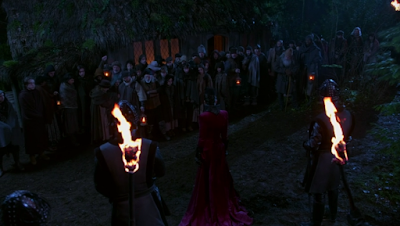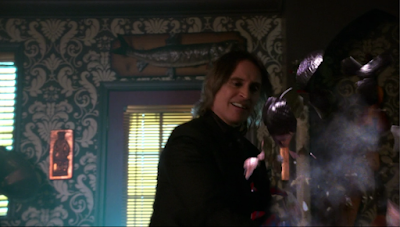Read the previous entry in the series here.
Read the next entry in the series soon.
2.22, "And Straight on 'til Morning"
Written by Edward Kitsis and Adam Horowitz
Directed by Dean White
Synopsis
The final episode of the season opens with a focus on a tall ship sailing, one soon revealed to be Hook's Jolly Roger, aboard which Smee encourages Hook's revenge and reports that Baelfire sleeps but will be well. They confer about his origin, Smee voicing fears that Hook allays. Shortly after, the pair confer with Baelfire, who explains his arrival in Neverland and bristles at Hook before announcing his name--which Hook recognizes. The captain welcomes him to the crew.
 |
| Are you not entertained? Image taken from the episode, used for commentary. |
Beneath Storybrooke, Hook accompanies Greg and Tamara as they proceed along their orders and retrieve one of the dwarves' pickaxes to use the artifact stolen from Regina, which will undo Storybrooke. Hook challenges them, and they activate the artifact, which begins to unmake the town, allowing the original forest to reclaim the area. Regina returns to herself in company with Emma, Mary Margaret, David, and Henry as the destruction begins. Hook arrives shortly after and is punched and threatened by David in short order; Regina offers to hinder the destruction as the rest prepare to effect evacuation from Storybrooke. Regina offers a sincere apology to Henry.
Near Neverland, the Jolly Roger receives a delegation, Smee encouraging Hook to surrender Baelfire thereto. Hook refuses, citing Baelfire's utility as the delegation boards. The delegation, consisting of Lost Boys, demands the surrender of the boy, searching the ship for him. They do not find him, and they leave with dire warnings for Hook and his crew. Baelfire takes the demonstration to heart.
Gold confronts the dwarves in his shop as they note having found a remedy for their brother's malady. Grumpy offers a dose of the remedy to Gold for Belle as he heads off. Other preparations for the evacuation continue, with David and Hook moving to confront Greg and Tamara.
 |
| What arrr you thinking? Image taken from the episode, used for commentary. |
David and Hook confer as they proceed against Greg and Tamara. Melee and pursuit begin, with Hook securing a bean as Greg and Tamara flee. Meanwhile, Emma and Regina proceed to the active artifact. Regina purposes to remain behind as the rest of the town flees; Emma attempts to dissuade her from her self-sacrifice, unsuccessfully. Gold and Lacey face their own ends soddenly, and Gold doses her with the remedy Grumpy gave him; it restores Belle to herself, and the two reconcile tearfully.
Discussion of options ensues, with Mary Margaret suggesting removing the artifact and Emma rejecting the idea as overly risky. Emma is overruled, and she overrules Hook's attempt to escape, in turn. He challenges her about her motives, and she asserts a desire to save Henry from losing another family member, Baelfire already having fallen. The news of Baelfire's loss stuns Hook.
Smee challenges Hook regarding Baelfire. Baelfire challenges Hook regarding Milah and learns the truth of her death. Baelfire demands to be taken back to the Darlings; Hook notes the impossibility, and Baelfire turns away from him in teenage angst.
The attempt to send the artifact away is made, despite Regina's objections, and Emma finds that the bean upon which they had relied is absent, Hook having palmed the object and returned to the Jolly Roger to make good his escape. Near Neverland, Baelfire makes to depart the Jolly Roger, Hook attempting to dissuade him from going. He does not succeed, so he turns Balefire over to the Lost Boys, albeit with some regret--that afflicts him as he makes to leave Storybrooke.
 |
| Ooh. Pretty colors. Image taken from the episode, used for commentary. |
Baelfire finds himself on the shores of the Enchanted Forest. And Henry, as it happens, is in Neverland, where his father had been taken before--and Peter Pan awaits.
Discussion
As the final episode of the season, the present episode does not bring in much, if anything, new; it would hardly be narratively appropriate to do so. But I do note the interesting refusal of the series to allow a self-sacrifice by one of the major characters; Regina had a chance at redemption by remaining in place to ensure the rest could flee, a gesture that would resonate with modern viewership no less than with medieval readership regarding a similar thing, John 15:13 being a common point of reference. For the earlier, Christianity would be taken as a given (if not always accurately so, as others can attest more fully than I), and self-sacrifice is at the heart of Christian ideology; for Regina to act in such a way would be an eminently fitting gesture. And for the latter, self-sacrifice remains lauded, as lists of honors and awards, both civilian and military, attest.
Admittedly, production reasons--described by TV Tropes as "Status Quo is God"--suggest why the gesture would be refused; it's hard to keep a character in place who is dead, after all, and resurrecting a character after a sacrifice cheapens the sacrifice (comic books might learn such lessons usefully), while disposing of a popular character is likely to have adverse effects on ratings. Still, it's a strange thing to consider from not only a perspective of medievalist interpretation, but also from a perspective of "this is a Christian nation, founded on Christian principles" so often voiced about the United States (albeit not accurately and with a decidedly slanted interpretation of Christianity, as recent events amply demonstrate), whose population can be presumed to be the primary audience of the series.
But that's an argument for another place and time, one far more emphatic and immediate than my commentaries here can ever be.
As a reminder, there will be a break before I take up Season 3. Gotta make sure I'm ready for #Kzoo2022--and then I'll need a rest!

























